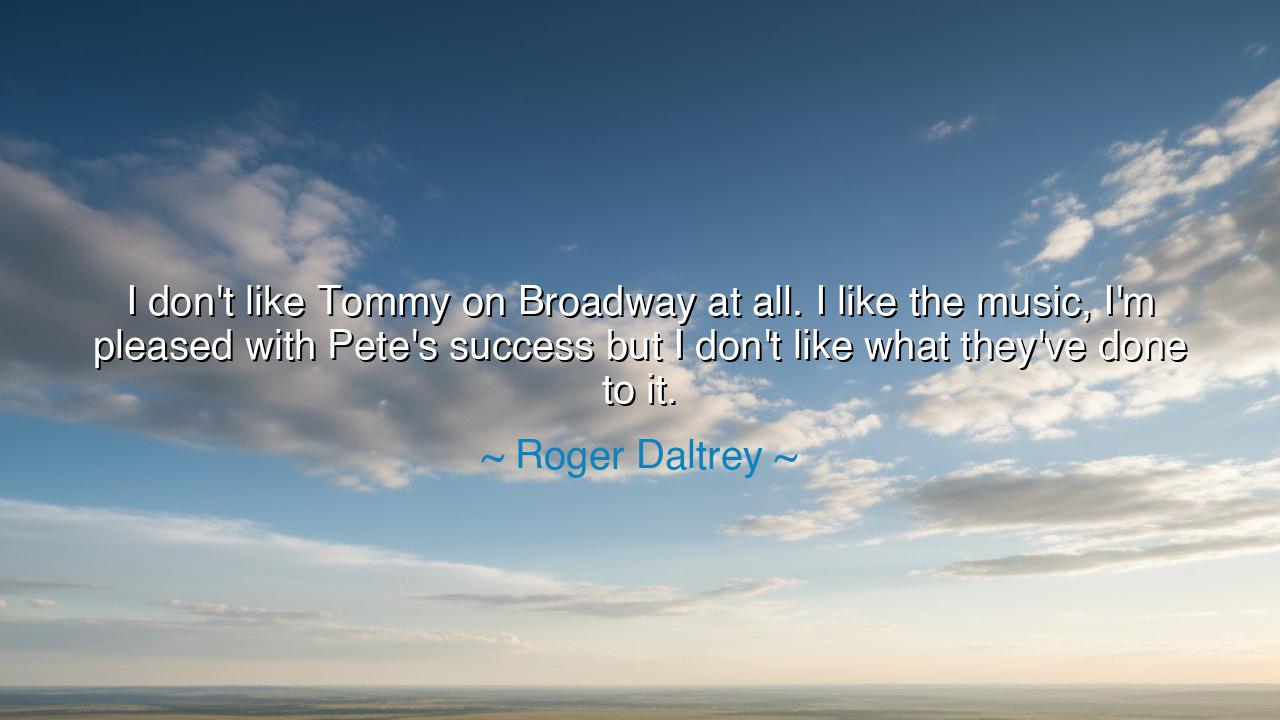
I don't like Tommy on Broadway at all. I like the music, I'm
I don't like Tommy on Broadway at all. I like the music, I'm pleased with Pete's success but I don't like what they've done to it.






Roger Daltrey, the thunderous voice of The Who, once declared: “I don’t like Tommy on Broadway at all. I like the music, I’m pleased with Pete’s success, but I don’t like what they’ve done to it.” These words strike with the weight of both love and sorrow, for they reveal the pain of seeing one’s creation altered beyond recognition. To Daltrey, Tommy was not simply a piece of entertainment—it was a living thing, a vessel of spirit born in the age of revolution and rebellion. To see it reshaped upon the gilded stage of Broadway was to witness a spark of truth dimmed by polish, a cry of defiance softened by theatrical hands.
The ancients knew this struggle well. The poet Homer spoke the epics aloud to his people, and they were alive in the breath of the bard. But in later centuries, scribes wrote them down, changing their power, fixing them in ink, stripping them of the raw thunder of performance. In Rome, the gladiators’ struggle was transformed from sacred rite into spectacle for the crowd. So too, Daltrey’s lament is the echo of an old truth: when a work born of fire is handed to the marketplace, it risks being reshaped into something safer, something less dangerous, something that no longer carries the same soul.
For Tommy, the rock opera created by Pete Townshend and carried by Daltrey’s voice, was no ordinary tale. It was the story of trauma, awakening, and the search for transcendence in a fractured world. In its original form, it was raw and unrefined, filled with the energy of a generation that questioned everything. But when Broadway took hold of it, costumes and choreography replaced rebellion, polish softened its jagged edges, and what was once the cry of the youth became a spectacle for tourists. Daltrey’s words are the cry of an artist who feels the essence of a work has been lost, even as its popularity has grown.
History offers many such examples. Consider the fate of Don Quixote, written by Cervantes as both satire and tragedy. Over time, countless adaptations softened its edge, turning the mad knight into a comic fool, stripping away the sorrow and humanity at its heart. Or the story of Spartacus, remembered in films more as spectacle than as a revolution of the oppressed. Each time art is reshaped to please the crowd, the danger arises that its deeper truth may be silenced. Daltrey’s protest is not against success, but against the dilution of spirit for comfort’s sake.
The meaning of his words is not bitterness but fidelity. He honors the music, honors Pete Townshend’s genius, and even respects the triumph of success. But he draws a line, reminding us that popularity does not always equal authenticity. What is celebrated by the masses may not carry the same fire as what was born in the struggle of creation. In this way, Daltrey speaks not only for himself, but for every artist who has ever seen their work altered, reshaped, and polished until its original voice was nearly lost.
The lesson for us is clear: guard the essence of your creations. When you make something from your heart, whether a song, a book, or a vision, know that the world may try to reshape it. There will be those who celebrate it, and those who distort it. Yet it is your duty to remember the heart of the work, the fire that birthed it, and never let that memory fade. Even when others celebrate a version you do not recognize, stand firm in your truth.
Therefore, let each soul take heed: when you create, create with honesty. When the world embraces your creation, give thanks for its reach. But when others twist or soften it, remember that the true work lives within you, unchanged. As Daltrey shows us, you may honor success yet still protest what has been lost. And in that protest lies integrity—the refusal to let the soul of your art be erased.
Thus Roger Daltrey’s words endure: “I don’t like Tommy on Broadway at all. I like the music, I’m pleased with Pete’s success, but I don’t like what they’ve done to it.” They remind us that true art is not measured by applause or ticket sales, but by the fire it carries from its origin. To live by this truth is to stand as guardian of one’s own soul, and to remind the world that art is not merely spectacle, but spirit.






AAdministratorAdministrator
Welcome, honored guests. Please leave a comment, we will respond soon